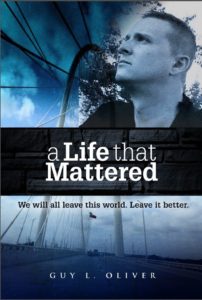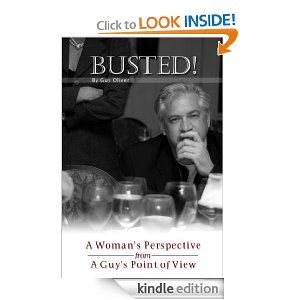I mentioned much earlier that when I was raising my children I tried to see the learning opportunity every situation presented. When you teach your children about music, about literature, about the world, about life, the learning transcends the content of the lesson. You are teaching them to learn. In my estimation it is unfortunate, though, that some lessons can only be learned as adults when they are beyond our daily influence.
We can teach our children how to do things. We can teach them the proper treatment of others. We can teach them facts about their world. Life, however, teaches nuance, reason, and judgement.
When to let someone into our lives. How far and how soon to let them in. And when it’s time let them go.
Tim never quite learned that last item very well. He was quick to let others in and he worked very hard at remaining in their lives, which is why I imagine it was hard for him to say goodbye to his prison friend Sam. I like to think that he missed Sam right up to the end—because that was the kind of man Tim was. But I also liked to think that Sam’s departure made his friendship with Trevor so much stronger and more precious.
In a 45 minute conversation with Trevor I was humbled at what I learned about my son.
“I met Tim at LaBlanc, a pre-release facility for inmates when they are being out-processed. During my time in prison I trusted no one. And then I saw Tim. There was something different about him. The way he carried himself. The way he spoke to the other inmates. The way he treated them, like they were human.
I knew immediately I could trust him and I wanted to befriend him. I knew he would be a good friend.”
A good friend. I have devoted most of my adult life to being a good parent and a good friend and my failures in both arenas are long and varied. But every failure, no matter how large or small, stays with me and I like to think that made me a better parent and a better friend.
In my conversations with Tim’s friends and acquaintances, I have the sense he had very few such failings—at least in the end. The reason people liked Tim was because he used his charm to walk into your life and, while there, cared for your sense of well-being.
“As it turns out, Tim was a Godsend. Among the other hardships we faced, was a lack of food.”
“I beg your pardon?”
“While we were at LaBlanc, there were budget cuts and so they suspended meals on weekends.”
“They didn’t feed you?”
“No—but we found ways to get food, and part of our mission was to make sure that nobody went unfed. There are ways to get money and so you could get food—but weekend meals were suspended.”
Choking back tears I simply replied
“I had no idea. I knew his mother was sending him money, but I thought currency had no value in prison.”
“We never went completely unfed, but we had to work at it. I really don’t want to say any more about it other than Tim never missed a meal and, to the degree that we were able, we extended that luxury to the others.”
I was reminded of a story Tim’s mother once told me at a time when we, ourselves, were poor and sometimes putting food on the table was a challenge. She took our children to a McDonalds drive-through on their way home from school—a very rare treat at that time.
When they arrived home, his mother discovered they had shorted the meal by one hamburger. Without hesitation he gave up his hamburger to one of his sisters.
The most basic human need other than air is food. As such, giving someone food is one of the most common ways we show our love to one another. It is no coincidence that Tim devoted part of his energy to making sure others were fed, and it is neither a coincidence that he formed a bond with others like him. This is who Tim was.
“He was also strong—a calming influence in volatile situations and chaotic moments, and there is no shortage of those in prison—though I witnessed it after we were released as well. People listened to him. I listened to him. It was like he had this ability to get your attention and talk sense to you.
When we got out, things were hard. I had trouble finding work and getting enrolled in school so we needed a lot of encouragement and we provided that for each other. Tim and I held each other accountable—to walk the straight and narrow. Another issue we faced in prison was no air conditioning.
In the summer it wasn’t unusual for it to be 110 degrees at night. There were nights when we couldn’t sleep on our cots; it was too hot. I developed a fear of closed spaces and the heat. I was actually diagnosed with PTSD, and I know Tim faced similar challenges.
So when we would have trouble, we would call, two, maybe three times each week. We’d hold each other accountable, discuss decisions we were contemplating and we offered each other affirmation whether this was a good decision or bad. We reasoned with each other.
Tim was my touchstone.”
After I spoke with Trevor a peculiar sense of tranquility washed over me. A sense that perhaps I was wrong.
The greatest burden of losing a child is the sense that he has been taken too soon. That he prematurely departed. That things are not as they should be. Such events spawn a sense of injustice—and when justice is not forthcoming we are all incensed.
The injustice derives from an insistence that we know best. In our human frailty and concern for self we demand that life—that God—not take from us what is rightfully ours. This is but one of many things I got wrong after Tim’s accident.
My son was not mine to hold forever.
I began to grasp the notion that my son came here to do what he was meant to do. I have said on countless occasions that at my funeral I want only one thing. I want just one person to say that I made a difference in his or her life. My son exceeded my goal.
The people with whom I’ve spoken regarding my son, to a person, all said the same things.
He was charming.
He loved everyone he met.
He gave into the lives of others.
He was a leader.
He inspired others to be better.
More than anything they would say
I don’t know where I’d be without his guidance.
A man lives his life and in the course of it makes mistakes, perhaps is trapped by vice, sometimes fails his friends and family. Tim was guilty of all this, as am I and many of you. But he redeemed his mistakes by giving into the lives of others.
In my estimation, that is enough.


